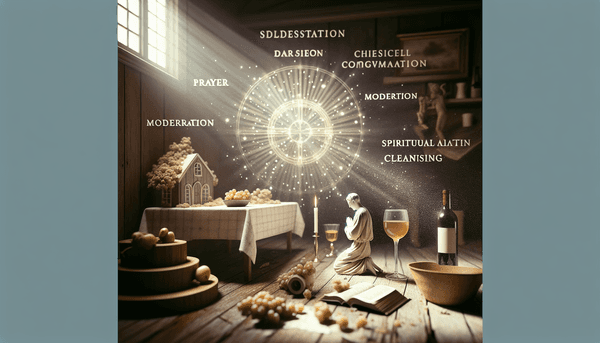The Power and Purpose of Prayer
Prayer is the spiritual lifeline that connects us to the Heavenly Father, a practice that is both intimate and powerful. Reflecting on the words of Philippians 4:6, we are reminded not to be anxious but to present our requests to God with thanksgiving. This act of communication transforms us, aligning our will with God's and allowing His peace, which surpasses all understanding, to guard our hearts and minds. The Scripture encourages us to pray without ceasing (1 Thessalonians 5:17), emphasizing the continual nature of this communion. As we utter our morning prayers, we echo the sentiments of Psalm 5:3, seeking guidance and strength for the day ahead. Similarly, nighttime prayers are a sanctuary for our weary souls, offering gratitude and seeking peace as we rest (Matthew 6:6). Through prayer, we are transformed, drawing closer to the divine and finding solace in His presence.
Longevity in Genesis: The Lifespans of Early Humanity
The book of Genesis presents us with a tapestry of genealogies, notable for the remarkably long lifespans of figures such as Adam, who lived for 930 years (Genesis 5:5), and Methuselah, whose 969-year lifespan stands as the longest recorded in the Bible (Genesis 5:27). These extraordinary durations can be seen as a testament to the original blessing and vitality of humanity in its nascent stages. Yet, following the Fall, the narrative shifts, and the human condition is altered by sin—introducing physical decay alongside spiritual death. A pivotal moment occurs post-Flood when God declares that man's days will be numbered to 120 years (Genesis 6:3), signifying a new phase in human longevity. These accounts, while they may confound us, serve as narrative and symbolic markers in our understanding of divine history and the human journey.
Afterlife Beliefs: Heaven and Waiting for Christ's Return
Christian eschatology is rich with diverse interpretations of what awaits the soul after death. The Scripture speaks of a heavenly dwelling prepared by Jesus, assuring us of a place in the Father's house (John 14:2-3). Believers find comfort in the promise of the resurrection, where the dead in Christ will rise first, followed by those who are alive, to meet the Lord in the air (1 Thessalonians 4:16-17). This hope of eternal life is a fundamental aspect of the Christian faith, offering solace and a future beyond our temporal existence. As we seek understanding in times of loss, Paul's words in 2 Corinthians 5:8 resonate with the courageous desire to be absent from the body and present with the Lord, reflecting a deep yearning for the ultimate communion with Christ. These beliefs frame our understanding of life's purpose and the afterlife, anchoring us in the assurance of God's eternal promise.
Faith in Action: The Relationship Between Prayer and Deeds
The intertwining of prayer and action within the Christian life is a dynamic that calls for both contemplation and engagement. The epistle of James reminds us that faith without works is dead, urging us to embody our beliefs through tangible acts of love and service (James 2:14-17). This harmonious blend of faith and deeds is further echoed in 1 John 3:18, where we are exhorted to love not only with words but through our actions. It is through this active faith, working through love (Galatians 5:6), that we truly honor God and fulfill His commandments. As we knock on the door of opportunity, initiating conversations about the Word, we are reminded that genuine discipleship involves doing the will of the Father (Matthew 7:21) and sharing what we have with others (Hebrews 13:16), thus reflecting the love of Christ in our daily lives.
Engaging with the Bible: Understanding People and Stories
The Bible is a profound collection of stories, characters, and teachings that have shaped the course of history and the lives of countless believers. Approaching its study with a systematic and contextual awareness allows us to fully appreciate the depth of its message. As 2 Timothy 3:16-17 states, all Scripture is God-breathed and is useful for instruction, reproof, correction, and training in righteousness. By meditating on God's Word day and night, as instructed in Joshua 1:8, we develop a comprehensive understanding of its teachings and the lives of those within its pages. Moreover, the practice of examining the Scriptures daily, like the noble Bereans in Acts 17:11, equips us to discern truth and apply it to our lives. Thus, the study of Scripture is not a passive endeavor but an active engagement with the living Word, lighting our path and guiding our steps (Psalm 119:105).
Conclusion
This journey through the conversations of faith has led us from the intimate whispers of prayer to the echoes of eternity. We have pondered the longevity of the ancients and the promise of life everlasting, weaving together the threads of prayer, action, and biblical literacy into the fabric of our Christian walk. These themes, anchored in Scripture, challenge us to live out our faith authentically, to seek understanding, and to grow closer to God. As we reflect on these insights, may we carry them with us, allowing them to shape our lives and our communities. Let this exploration be a catalyst for deeper faith, richer prayer, and a more profound engagement with the Word, as we continue to seek the face of the Almighty.






